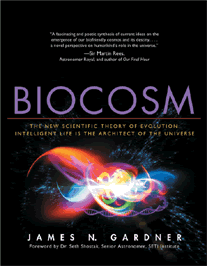| Biocosm | 2006-02-20 23:22 4 comments |
 by Flemming Funch by Flemming FunchBiocosm - "The new scientific theory of evolution: intelligent life is the architect of the universe". Why is the universe bio-friendly? Bioastronomy, once an intriguing and speculative sideline, has become a major focus for cosmologists. James N. Gardner presents a startling hypothesis for how our apparently bio-friendly universe began and what its ultimate destiny will be. Originally presented in peer-reviewed scientific journals, his radical “Selfish Biocosm” hypothesis proposes that life and intelligence have not emerged in a series of Darwinian accidents but are essentially hardwired into the cycle of cosmic creation, evolution, death, and rebirth. He argues that the destiny of highly evolved intelligence (perhaps our distant progeny) is to infuse the entire universe with life, eventually to accomplish the ultimate feat of cosmic reproduction by spawning one or more “baby universes,” which will themselves be endowed with life generating properties. In this explanation of the role of life in the cosmos, Gardner presents an eloquent and lucid synthesis of the most recent advances in physics, cosmology, biology, biochemistry, astronomy, and complexity theory. These disciplines increasingly find themselves approaching the frontier of what was once the exclusive province of philosophers and theologians. Gardner’s Selfish Biocosm hypothesis challenges both Darwinists and advocates of intelligent design, and forces us to reconsider how we ourselves are shaping the future of life and the cosmos.Ah, great!! Very refreshing that a science guy can get away with that, and manages to get it through peer-reviewed mine fields. The world must indeed be changing. And it is funny and ironic that science might end up in a roundabout way with such a spiritual view of life and the universe. I don't really care how it happens, but I'm all for it. Of course the universe is intelligent and inherently generating life. For that matter, that's the only view that can integrate science and spirituality. I've ordered the book. |